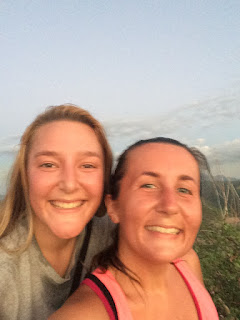Hola,Welcome to the Whale Shark Research Project intern and volunteer blog. Here we will be posting information about what we’ve been doing, special events and the city of La Paz. The WSRP volunteer program was developed to build a connection between a working research project and an opportunity for passionate volunteers to join and help with the conservation of these vulnerable sharks. How this works is two volunteer interns join the project for ten weeks and volunteers come for a minimum of two weeks throughout the season to help assist with the daily research duties. Darren and Manolo are here year round to run the project and study the sharks. Look here for updates from the interns and volunteers!
We arrived here in mid October and started the internship program with the Whale Shark Boot Camp! While it might sound like a difficult work out program, it was in reality a great way to learn as much as possible about the sharks and our part in the research program.
Day 1 involved just getting acquainted with the city of La Paz and all its beauty.
La Paz is a good size city with a definite tourist area (the Malecon), beaches a bit further north into the city and true city areas with businesses and shops. Day 2 we started with the presentations about whale sharks. We learned about the size of sharks, what research is being done and how we’d be getting involved in the work during our stay. We learned about how to take photos of the sharks for identification and how to interact with the animals in the water.
Then it was time for some practice with Wally.
Our first time out on the boat, we ventured to the marina carrying our whale shark Wally who is made out of recycled PVC pipes and canvas. The team took us in the water to practice taking photos of Wally’s sides for ID and to practice our duck diving skills for whale sharking.
Manolo is a free diving instructor and kept casually photo bombing our ID shots when we’d snorkel down to the side of Wally. Darren had the job of swimming around pulling our super realistic shark around so we could chase it around in the waves. Once we were happy with our ability to take ID photos we returned to shore for much needed Tacos!
The next day we went out on the sea to start taking photos of the real sharks. We had eleven whale sharks on our first day, It was amazing!
The following days were full of presentations on how to use the different software to identify the sharks and create fingerprints. Finally, we took a test with practice sharks (hint hint… Darren tries to trick you on the test) and made fingerprints for the test photos to see if we have learnt anything during our boot camp training.
Looking at our first day of data and were able to learn which sharks had been seen in the bay and get our first look at real marine science. The next part of Whale Shark Boot camp was a presentation from Manolo on free diving where we talked about breathing and equalization techniques to help us with our work in the field. We also learned about the different types of free diving and how people train and get involved in the sport of free diving. After this we spent some time in the pool practicing static breath hold techniques.
The final part of whale shark boot camp was climbing what I’ve affectionately named the Mount Everest of La Paz (the real name is el cerro de la calavera). Darren kept talking about the incredible sunset views from the top and while hiking isn’t my sport, Ashley, Darren and I ventured to the top of the mountain or hill as they like to call it. We made it to the top by going up the steepest part only to find out there is a much easier trail at the back of the mountain. From the top, we took some quick sunset photos (it was gorgeous) and were able to see the outlines of a few whale sharks in the bay! See photo below!





Very significant Information for us, I have think the representation of this Information is actually superb one. This is my first visit to your site. Shark conservation volunteers
ReplyDelete